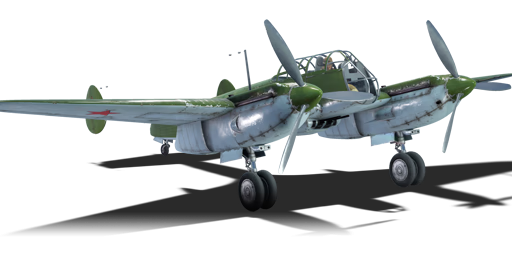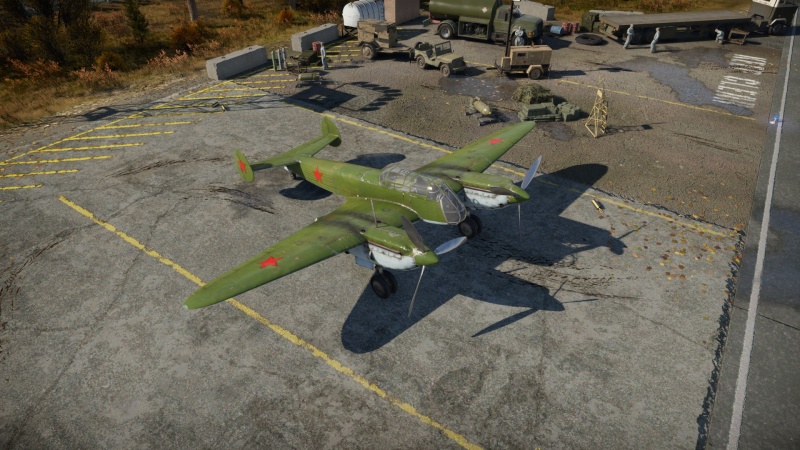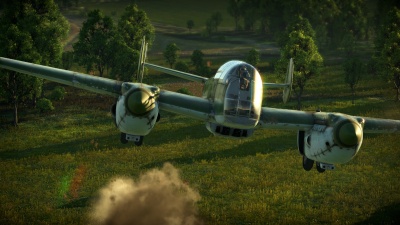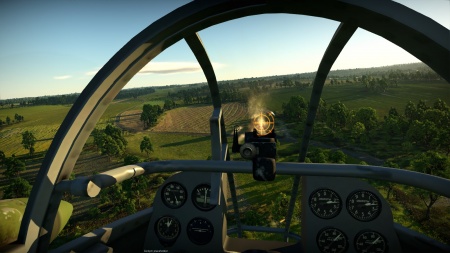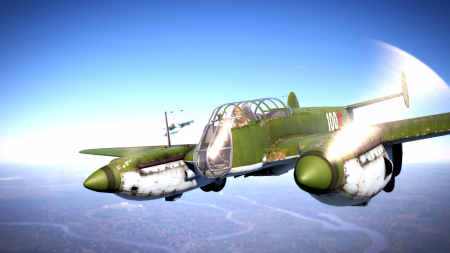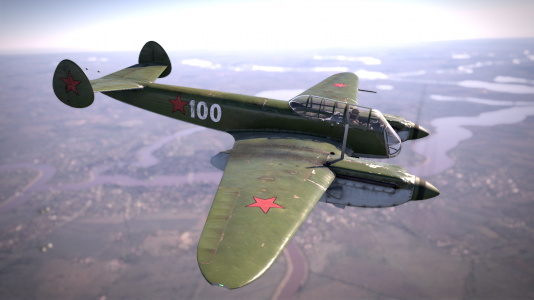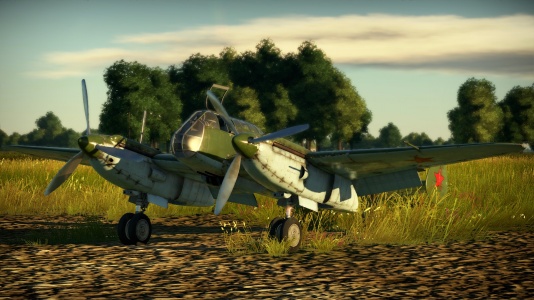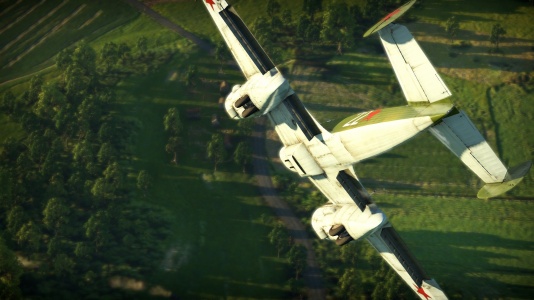Difference between revisions of "Yak-2 KABB"
Legoknekten (talk | contribs) m (→Usage in battles) (Tag: Visual edit) |
(→Description: Reformatted) |
||
| (3 intermediate revisions by 3 users not shown) | |||
| Line 6: | Line 6: | ||
== Description == | == Description == | ||
<!-- ''In the description, the first part should be about the history of and the creation and combat usage of the aircraft, as well as its key features. In the second part, tell the reader about the aircraft in the game. Insert a screenshot of the vehicle, so that if the novice player does not remember the vehicle by name, he will immediately understand what kind of vehicle the article is talking about.'' --> | <!-- ''In the description, the first part should be about the history of and the creation and combat usage of the aircraft, as well as its key features. In the second part, tell the reader about the aircraft in the game. Insert a screenshot of the vehicle, so that if the novice player does not remember the vehicle by name, he will immediately understand what kind of vehicle the article is talking about.'' --> | ||
| − | The '''{{ | + | The Yak-2 was initially built to be a light bomber and reconnaissance aircraft. Originally known as Ya-22, the aircraft was redesignated to Yak-2 later in 1941. Like many aircraft making the transition into World War II, it was constructed of wood, duralumin, steel framing, and fabric skin. Early prototypes exhibited issues with the engine cooling system, brakes, and the fuel system which resulted in the crash of one of the prototypes. Pressed into service, the Yak-2 saw early action as Germany made their rush into the Soviet Union. Conversion options of the Yak-2 resulted in an unusual setup, but a functioning multi-use aircraft. The '''{{PAGENAME}}''' (Russian: ''kombineerovannaya artillereeysko-bombardirovochnaya batareya Mozharovskovo i Venevidova''; English: "combined gun/bomb battery designed by Mozharovskiy and Venevidov") eliminated the need of the radio/gunner and replaced that compartment with the capability to carry four 100 kg bombs. To aid the pilot in bombing targets, the nose of the aircraft was reconfigured to be an all-glazed nose, allowing the pilot fantastic visibility out the front of the aircraft. A ventral pack was mounted directly below the cockpit containing two 20 mm autocannons and two 7.62 mm machine guns which do not require the pilot to adjust for convergence when shooting as they are directly in-line with the fuselage. |
| − | + | Introduced in [[Update 1.75 "La Résistance"]], the {{PAGENAME}} finds itself in an excellent position as either a fighter/bomber interceptor or as a ground attacker. Early in matches, if the {{PAGENAME}} can attain a superior altitude over other fighters and bombers, then it can utilise the Boom & Zoom technique to attack fighters and bombers below it or to engage or outrun enemy fighters which manage to get up to the same altitude. As a low-level attacker, this aircraft does a great job of getting to targets where it can strategically bomb vehicles and anti-aircraft guns and when the bombs run out, the 20 mm and 7.62 mm machine guns can be turned on them to also inflict damage and destruction. | |
| − | |||
| − | |||
| − | |||
| − | |||
== General info == | == General info == | ||
| Line 19: | Line 15: | ||
<!-- ''Describe how the aircraft behaves in the air. Speed, manoeuvrability, acceleration and allowable loads - these are the most important characteristics of the vehicle.'' --> | <!-- ''Describe how the aircraft behaves in the air. Speed, manoeuvrability, acceleration and allowable loads - these are the most important characteristics of the vehicle.'' --> | ||
| − | The {{PAGENAME}} has great manoeuvrability, especially when it comes to low-altitude flying, and also performs well at mid-altitudes too. It can be used as a great low-altitude ground-attack heavy fighter which can focus its four bombs and cannon/machine gun combination on light vehicles and anti-aircraft instalments. The turn rate is very good, which allows the {{PAGENAME}} to compete easily with some fighters can outperform other heavy fighters such as those from the Potez 630 family. | + | The {{PAGENAME}} has great manoeuvrability, especially when it comes to low-altitude flying, and also performs well at mid-altitudes too. It can be used as a great low-altitude ground-attack heavy fighter which can focus its four bombs and cannon/machine gun combination on light vehicles and anti-aircraft instalments. The turn rate is very good, which allows the {{PAGENAME}} to compete easily with some fighters and can outperform other heavy fighters such as those from the Potez 630 family. |
{| class="wikitable" style="text-align:center" width="70%" | {| class="wikitable" style="text-align:center" width="70%" | ||
| Line 61: | Line 57: | ||
! Combat !! Take-off !! Landing !! + !! - | ! Combat !! Take-off !! Landing !! + !! - | ||
|- | |- | ||
| − | | {{Specs|destruction|body}} || {{Specs|destruction|gear}} || | + | | 680 <!-- {{Specs|destruction|body}} --> || {{Specs|destruction|gear}} || - || - || 280 || ~19 || ~11 |
|- | |- | ||
|} | |} | ||
| Line 118: | Line 114: | ||
In Ground RB, the Yak-2 can act as an excellent fighter, as it excels in low-altitude combat. You can also exploit the 4 x FAB-100s on board to hit light targets like TDs and SPAAs. The Yak-2 is highly manoeuvrable and fast at the low altitudes of dogfights in the game mode and the twin ShVAK cannons will shred enemy airframes, although take care on expelling too much ammunition as you can only carry 150 rounds per cannon. Do not attempt heavy dives as the controls easily lock up, and the cockpit has no forward-facing protection, so head-on attacks are very risky. Despite its size and use as an attacker, no defensive armament exists on the aircraft. | In Ground RB, the Yak-2 can act as an excellent fighter, as it excels in low-altitude combat. You can also exploit the 4 x FAB-100s on board to hit light targets like TDs and SPAAs. The Yak-2 is highly manoeuvrable and fast at the low altitudes of dogfights in the game mode and the twin ShVAK cannons will shred enemy airframes, although take care on expelling too much ammunition as you can only carry 150 rounds per cannon. Do not attempt heavy dives as the controls easily lock up, and the cockpit has no forward-facing protection, so head-on attacks are very risky. Despite its size and use as an attacker, no defensive armament exists on the aircraft. | ||
| − | |||
| − | |||
===Manual Engine Control=== | ===Manual Engine Control=== | ||
Latest revision as of 12:54, 22 January 2024
Contents
Description
The Yak-2 was initially built to be a light bomber and reconnaissance aircraft. Originally known as Ya-22, the aircraft was redesignated to Yak-2 later in 1941. Like many aircraft making the transition into World War II, it was constructed of wood, duralumin, steel framing, and fabric skin. Early prototypes exhibited issues with the engine cooling system, brakes, and the fuel system which resulted in the crash of one of the prototypes. Pressed into service, the Yak-2 saw early action as Germany made their rush into the Soviet Union. Conversion options of the Yak-2 resulted in an unusual setup, but a functioning multi-use aircraft. The Yak-2 KABB (Russian: kombineerovannaya artillereeysko-bombardirovochnaya batareya Mozharovskovo i Venevidova; English: "combined gun/bomb battery designed by Mozharovskiy and Venevidov") eliminated the need of the radio/gunner and replaced that compartment with the capability to carry four 100 kg bombs. To aid the pilot in bombing targets, the nose of the aircraft was reconfigured to be an all-glazed nose, allowing the pilot fantastic visibility out the front of the aircraft. A ventral pack was mounted directly below the cockpit containing two 20 mm autocannons and two 7.62 mm machine guns which do not require the pilot to adjust for convergence when shooting as they are directly in-line with the fuselage.
Introduced in Update 1.75 "La Résistance", the Yak-2 KABB finds itself in an excellent position as either a fighter/bomber interceptor or as a ground attacker. Early in matches, if the Yak-2 KABB can attain a superior altitude over other fighters and bombers, then it can utilise the Boom & Zoom technique to attack fighters and bombers below it or to engage or outrun enemy fighters which manage to get up to the same altitude. As a low-level attacker, this aircraft does a great job of getting to targets where it can strategically bomb vehicles and anti-aircraft guns and when the bombs run out, the 20 mm and 7.62 mm machine guns can be turned on them to also inflict damage and destruction.
General info
Flight performance
The Yak-2 KABB has great manoeuvrability, especially when it comes to low-altitude flying, and also performs well at mid-altitudes too. It can be used as a great low-altitude ground-attack heavy fighter which can focus its four bombs and cannon/machine gun combination on light vehicles and anti-aircraft instalments. The turn rate is very good, which allows the Yak-2 KABB to compete easily with some fighters and can outperform other heavy fighters such as those from the Potez 630 family.
| Characteristics | Max Speed (km/h at 4,800 m) |
Max altitude (metres) |
Turn time (seconds) |
Rate of climb (metres/second) |
Take-off run (metres) | |||
|---|---|---|---|---|---|---|---|---|
| AB | RB | AB | RB | AB | RB | |||
| Stock | 497 | 479 | 9100 | 20.0 | 20.6 | 9.2 | 9.2 | 450 |
| Upgraded | 548 | 520 | 17.9 | 19.8 | 21.0 | 12.8 | ||
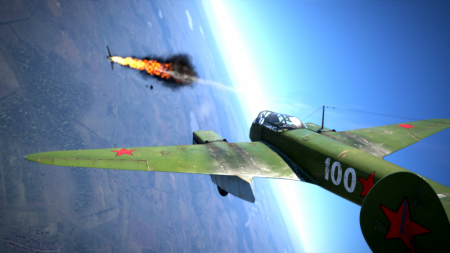
Details
| Features | ||||
|---|---|---|---|---|
| Combat flaps | Take-off flaps | Landing flaps | Air brakes | Arrestor gear |
| X | X | ✓ | X | X |
| Limits | ||||||
|---|---|---|---|---|---|---|
| Wings (km/h) | Gear (km/h) | Flaps (km/h) | Max Static G | |||
| Combat | Take-off | Landing | + | - | ||
| 680 | 320 | - | - | 280 | ~19 | ~11 |
| Optimal velocities (km/h) | |||
|---|---|---|---|
| Ailerons | Rudder | Elevators | Radiator |
| < 360 | < 360 | < 400 | > 340 |
Survivability and armour
- 8 mm Steel plate in pilot's seat
- Self-sealing fuel tanks (3 in each wing)
For an attacker aircraft, the Yak-2 KABB is in a unique situation that it is not outfitted with various armour plates and bulletproof glass as one might expect, however, this aircraft has only one armour plate and that is the 8 mm steel plate located behind the pilot's seat. This steel plate helps protect the pilot from largely machine gun fire from the rear quadrant, but that is about it. Since this version of the Yak-2 was modified from the original version and very few were built, what would typically be later additions never made it to the aircraft. As such, the plexiglass cockpit windows all around the pilot including the entire front face are just standard plexiglass and this makes it very dangerous when manoeuvring into a head-on attack. Such attacks should be avoided as not only is the pilot vulnerable to being knocked out, but both engines are unprotected and could take damage and typically any damage taken from a head-on attack results in critical damage or total failure of the hit component (though the aircraft can fly on one engine, it cannot continue if the pilot is knocked out).
Modifications and economy
Armaments
Offensive armament
The Yak-2 KABB is armed with:
- 2 x 20 mm ShVAK cannons, chin-mounted (150 rpg = 300 total)
- 2 x 7.62 mm ShKAS machine guns, chin-mounted (500 rpg = 1,000 total)
The Yak-2 KABB is unique compared to many other fighters and attackers found in War Thunder in that its machine guns and autocannons are mounted in a ventral turret just below the cockpit. All guns are forward-facing which allow for the pilot to fire at any distance without having to worry about calculating for convergence, just for the bullet drop of the ammunition. If all four guns are fired at the same time, the ShVAK cannons will run out of ammunition first, which can be a problem when attacking an enemy aircraft as they are the harder-hitting weapons. The machine guns by themselves can take down another fighter, however it either takes well-placed shots for a pilot snipe or critical damage to the coolers or engine, otherwise, the enemy aircraft will typically just soak up the machine gun rounds.
Suspended armament
The Yak-2 KABB can be outfitted with the following ordnance:
- Without load
- 4 x 100 kg FAB-100sv bombs (400 kg total)
If the Yak-2 KABB is to solely be used as a fighter/bomber interceptor, select the option "Without load" as the 400 kg of bombs will hinder the performance of the aircraft in its ability to manoeuvre effectively. When going for the ground-attack role, selecting the 4 x 100 kg bombs will allow the Yak-2 KABB to attack lighter ground targets such as trucks, anti-aircraft artillery and light tanks. This load of bombs is less effective when it comes to bombing bases, instead, it should be relegated for one-off targets which are typically scattered around the map. If the bombs don't take out all of the targets, it is easy to turn the attacker around and eliminate the rest of the targets with the autocannons and machine guns.
Usage in battles
In Ground RB, the Yak-2 can act as an excellent fighter, as it excels in low-altitude combat. You can also exploit the 4 x FAB-100s on board to hit light targets like TDs and SPAAs. The Yak-2 is highly manoeuvrable and fast at the low altitudes of dogfights in the game mode and the twin ShVAK cannons will shred enemy airframes, although take care on expelling too much ammunition as you can only carry 150 rounds per cannon. Do not attempt heavy dives as the controls easily lock up, and the cockpit has no forward-facing protection, so head-on attacks are very risky. Despite its size and use as an attacker, no defensive armament exists on the aircraft.
Manual Engine Control
| MEC elements | ||||||
|---|---|---|---|---|---|---|
| Mixer | Pitch | Radiator | Supercharger | Turbocharger | ||
| Oil | Water | Type | ||||
| Controllable | Controllable Not auto controlled |
Controllable Not auto controlled |
Controllable Not auto controlled |
Separate | Not controllable 1 gear |
Not controllable |
Pros and cons
Pros:
- Very manoeuvrable at low altitudes, excellent for higher altitude Boom & Zoom
- Powerful armament consists of 2 ShVAK cannons and 2 ShKAS machine guns centrally mounted (no need to adjust for convergence)
- Armament is more than adequate to destroy enemy aircraft
- Good speed it allows it to be used as both a fighter and bomber interceptor
- Can actually be used as a heavy fighter
- Decent rate of climb
Cons:
- Payload option is only 4 x 100 kg bomb, limited to only destroying light targets
- No defensive armaments
- The cockpit doesn't have armoured glass, head-on attacks are very dangerous
- Engines are easily damaged/water-cooled
- Controls stiffen in high-speed dives
- Rudder controlled manoeuvres difficult due to the small surface area on the vertical stabilizers
History
The Yak-2 KABB was a ground attack version of the Yak-2 light bomber (not available in game) designed by George Mozharovsky and Ivan Venevidov (MV), who were two renowned designers of aircraft armament. They specialized in developing and building many variants of reloading systems, targeting sights, weapon suspensions systems, bomb deployment mounts and the "MV" series of aircraft gun turrets. In late 1940, Mozharovsky and Venevidov invented a new type of gun mount for attack aircraft called the "комбинированной артиллерийско-бомбардировочной батареей" (Russian for "Combined artillery-bomb battery") or KABB for short which was mounted to the ventral side of the aircraft. The premise behind this gun mount was it utilized two 20 mm ShVAK cannons and two ShKAS machine guns and the cannons could be pivoted mechanically from horizontal to downside of a maximum of 30 degrees. The cannons pivoted electrically while they were connected to the K-8T gun sight which pivoted mechanically tracking with the cannons, automatically adjusting as the cannons moved. The cannons could be fixed at an intermediate position between the 0 and 30-degree range. This system allowed the pilot to maintain horizontal flight and set up for his bombing run while suppressing the target with cannon fire at the same time. Hence the name for "combined artillery-bomb battery."
Installation of the KABB-MV system into the Yak-2 required significant modifications to the main fuselage and cockpit. The nose of the aircraft was removed along with part of the side panels to allow for the installation of plexiglass, significantly improving the visual field of the pilot. Bomber controls were also relocated into the pilot's cockpit due to the navigator/bomber/gunner position being removed. Because of the installation of the fixed and movable frames of the KABB system and addition of ammunition cartridge boxes, the floor of the navigator's cabin was removed.
Tests of this new system in March to April 1941 produced favourable results, with recommendations to attach this new system to single and double-engined aircraft, but the German invasion in June 1941 halted all prototype work to focus on the enemy threat.
Media
- Skins
- Images
- Videos
See also
- Related development
- Yakovlev Yak-4
- Aircraft of comparable role, configuration and era
External links
- Official data sheet - more details about the performance
- [Sovietwarplanes pages] Yak-2 with KABB-MV
- [Secret Projects] Mozharovski MV Kombain (Shturmovik) aircraft
| A.S. Yakovlev Design Bureau (Яковлев Опытное конструкторское бюро) | |
|---|---|
| Fighters | |
| Yak-1 | Yak-1 · Yak-1B |
| Yak-3 | Yak-3 · Yak-3(e) Eremin's · Yak-3 (VK-107) · Yak-3P · Yak-3T · Yak-3U |
| Yak-7 | Yak-7B |
| Yak-9 | Yak-9 · Yak-9B · Yak-9K · Golovachev's Yak-9M · Yak-9P · Yak-9T · Yak-9U · Yak-9UT |
| Twin-engine fighters | I-29 |
| Jet fighters | |
| Yak-15 | Yak-15P · Yak-15 |
| Yak-17 | Yak-17 |
| Yak-23 | Yak-23 |
| Yak-30 | Yak-30D |
| Yak-141 | Yak-141 |
| Strike aircraft | |
| Yak-2 | Yak-2 KABB |
| Yak-38 | Yak-38 · Yak-38M |
| Bombers | Yak-4 |
| Jet bombers | Yak-28B |
| Foreign use | ▄Yak-3 · Challe's ▄Yak-9T · ◔Yak-9P |
| Captured | ▀Yak-1B |
| USSR strike aircraft | |
|---|---|
| IL-2 | IL-2 (1941) · IL-2 (1942) · IL-2M (1943) · IL-2M type 3 · IL-2M "Avenger" · IL-2-37 · IL-2 M-82 |
| IL-8 | IL-8 (1944) |
| IL-10 | IL-10 · IL-10 (1946) |
| Pe-3 | Pe-3 (e) · Pe-3 · Pe-3bis |
| Su-2 | BB-1 · Su-2 MV-5 · Su-2 TSS-1 · Su-2 (M-82) |
| Su-6 | Su-6 · Su-6 (AM-42) · Su-6 (M-71F) |
| Su-8 | Su-8 |
| Tandem MAI | Tandem MAI |
| TIS MA | TIS MA |
| Tu-1 | Tu-1 |
| Yak-2 | Yak-2 KABB |


